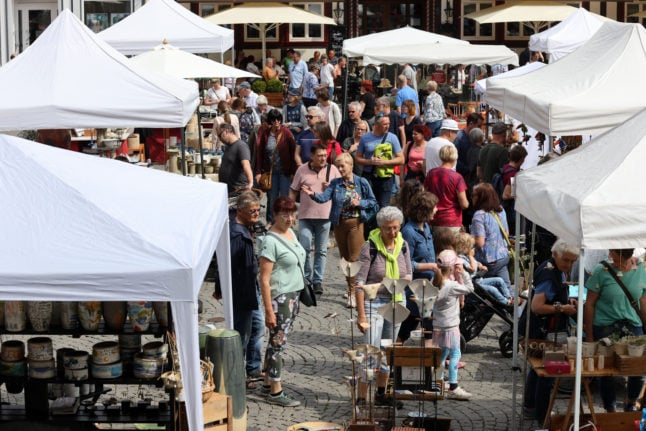Cost of living: How to save money in Germany this summer

The cost of living has been increasing in Germany as inflation rises to record levels. Here's how you can make the most of the summer on a tight budget.
In June Germany's inflation rate stood at 7.6 percent, meaning consumer prices have been on an almost constant upwards spiral for 18 months.
Meanwhile, year-on-year energy costs were up 38 percent in June, according to official figures, while prices for food increased by 12.7 percent in the same timeframe.
Needless to say, price hikes are putting a major strain on households in Germany.
We looked at ways of spending money sensibly, and how to make savings.
READ ALSO: How does the cost of food in Germany compare to other countries?
Transport
One of the most climate-friendly and cheapest ways of getting around is by bike. You might have to shell out for a bicycle and a sturdy lock (bike theft is rife in cities), but once you do you're sorted. Cycling also has the added bonus of keeping you fit and healthy.
But if cycling isn't for you - or you also want to jump on the bus sometimes - then do take advantage of Germany's mega-cheap transport offer. The €9 monthly ticket runs until the end of August so you can still buy it for July and once again in August. You can use it for work and leisure, so get out on some trips if you can.
READ ALSO: Which foreign countries can you visit with Germany's €9 ticket?
Surprisingly, some people in Germany have been buying the regular monthly tickets - which cost anywhere between €60 and €90 - despite the reduced price offer. In June, public transit operator Großraum-Verkehr-Hannover (GVH), said 1,800 people bought a regular monthly ticket and 5,000 people bought one in the Berliner Verkehrsbetriebe (BVG) network. If you're buying the regular priced tickets because you can afford it and want to support the transport firms then that's great. But if it was an accident then please - keep the €9 ticket in mind and get it next time!
If you drive then the government also has a fuel tax cut in place until the end of August (although it's not making too much of a dent on fuel prices). And save money on long distance train travel by booking early when the Sparpreis (discount price) is available or consider getting a Bahncard.
READ ALSO: How to find cheap train tickets in Germany
Personal finance and insurance
Financial expert Anja Chiechowski from the consumer portal Finanztip.de recommends that people keep an eye on their spending by writing purchases down regularly, or using an app to log purchases. It shows you where most of your money is going so you can change your behaviour if needed.

Piggy banks with coins for sale for New Year's Eve and New Year's Day. Photo: picture alliance/dpa/APA | Georg Hochmuth
Chiechowski also says it helps to go through your bank statements and cancel any direct debits you have set up that you don't need anymore.
Germany has a strong culture of insuring against everything, so you have likely signed up to several insurance policies. You should check the terms and conditions, as well as the prices, of them regularly. If you find something better, change it. Health insurance or private liability insurance might be a few euros cheaper with another provider.
READ ALSO: How to change your health insurance provider in Germany
Keep an eye on how you pay your insurance. For instance if you pay your car insurance for the whole year instead of monthly, you can save up to 20 percent. It's the same for certain other subscriptions or memberships at the gym - it might be worth getting the annual deal in the long run. One thing to keep in mind is that Germany now has better consumer-friendly rights on cancelling contracts so you won't find yourself stuck after the initial contract term ends. Meanwhile, if you think you're being treated unfairly, check up on your rights or contact your local German consumer advice centre or Verbraucherzentrale.
Plus, if you believe the tariff you're paying is too high on your mobile phone or Internet bill, tell the company! They may offer you a better offer since they don't want to lose customers. Shop around and see what else is out there.
Shopping
People in Germany have been seeing major price hikes on food and drink across the board so this is an area where it pays to be careful.
Look out for weekly special offers in supermarkets and consider buying own brand. Head to discount chains in Germany such as Netto, Lidl, Aldi or Penny instead of other shops. Weekly food markets are also a good choice for getting more bang for your buck. You could also try and buy seasonal produce, which should be cheaper because it doesn't have to be imported.
Keep a hold of your old drinks bottles and claim back the Pfand (deposit). When you give your empty bottles or cans back, you get a receipt which you can use to either claim back the cash or get money off your shopping.
READ ALSO: Six essential tips to save money on your groceries in Germany
On other products, you can save a lot of cash by purchasing second-hand. Sites like ebay Kleinanzeigen are great for buying and selling locally, whether its furniture, bikes or appliances. There are also lots of second-hand-clothes platforms set up for this purpose too. If you have the time, you should also head to weekly flea markets (Flohmärkte) and see if you can find any bargains there.
READ ALSO: How to master second-hand shopping like a German

A weekly market in Wernigerode, Saxony-Anhalt. Photo: picture alliance/dpa | Matthias Bein
Energy
With insanely expensive prices, and the government trying to encourage people to cut down on energy ahead of winter over fears that Russia will turn off the gas supply, it makes sense to try and make changes to your usage. With around 67 percent of German household energy consumption used for heating, the greatest potential for savings lies in the heating of our living spaces, and in hot water. So make sure you are not turning the heating up too high in winter if it doesn't have to be. Experts recommend lowering the room temperature by one degree. You should also try and use less hot water when you can. Take a tip from Economy and Climate Minister Robert Habeck and have a shorter shower.
There are a few different ways that you can save money on electricity, too - don't leave items, like the washing machine or TV, on standby mode - switch them off fully. You should also make sure you switch off lights when you're not in the room.
Culture
If you're on a budget, it doesn't mean you shouldn't be able to enjoy culture in Germany. Look out for festivals and events that don't charge a fee to enter and, when possible, bring your own snacks and drinks with you.
Keep an eye out for days when museums and galleries are free to members of the public. For instance, on the first Sunday of every month, lots of museums in Berlin open their doors free of charge. Some museums and arts spaces in Munich are free all the time, while some museums offer entry for just €1 on Sundays.

A view of Museum Island and the TV tower in Berlin. Photo: picture alliance/dpa | Jörg Carstensen
Health and self-care
Last but not least, make sure to look after yourself whether that's taking a short walk during your lunch break, talking on the phone with a good friend or family member or buying yourself a Kaffee und Kuchen (coffee and cake) now and again. If you can manage, make the most of the German summer, which has reasonably good weather, by organising a trip to a lake or the countryside. You could also think about volunteering, joining a Verein (club) or finding a gym (or online classes) if your budget allows.
Don't hesitate to book an appointment with your GP if you are struggling or want to get something checked out. Health insurance costs a lot in Germany so make the most of it when you need it. You can also get in touch with your insurance provider to ask which services you are entitled to. For instance, people aged 35 and above can get a free comprehensive check-up every three years in Germany. Health insurance providers also offer reward schemes which can see you earn points to use for future treatments.
READ ALSO: How to make the most of reward schemes on your German health insurance
Comments
See Also
In June Germany's inflation rate stood at 7.6 percent, meaning consumer prices have been on an almost constant upwards spiral for 18 months.
Meanwhile, year-on-year energy costs were up 38 percent in June, according to official figures, while prices for food increased by 12.7 percent in the same timeframe.
Needless to say, price hikes are putting a major strain on households in Germany.
We looked at ways of spending money sensibly, and how to make savings.
READ ALSO: How does the cost of food in Germany compare to other countries?
Transport
One of the most climate-friendly and cheapest ways of getting around is by bike. You might have to shell out for a bicycle and a sturdy lock (bike theft is rife in cities), but once you do you're sorted. Cycling also has the added bonus of keeping you fit and healthy.
But if cycling isn't for you - or you also want to jump on the bus sometimes - then do take advantage of Germany's mega-cheap transport offer. The €9 monthly ticket runs until the end of August so you can still buy it for July and once again in August. You can use it for work and leisure, so get out on some trips if you can.
READ ALSO: Which foreign countries can you visit with Germany's €9 ticket?
Surprisingly, some people in Germany have been buying the regular monthly tickets - which cost anywhere between €60 and €90 - despite the reduced price offer. In June, public transit operator Großraum-Verkehr-Hannover (GVH), said 1,800 people bought a regular monthly ticket and 5,000 people bought one in the Berliner Verkehrsbetriebe (BVG) network. If you're buying the regular priced tickets because you can afford it and want to support the transport firms then that's great. But if it was an accident then please - keep the €9 ticket in mind and get it next time!
If you drive then the government also has a fuel tax cut in place until the end of August (although it's not making too much of a dent on fuel prices). And save money on long distance train travel by booking early when the Sparpreis (discount price) is available or consider getting a Bahncard.
READ ALSO: How to find cheap train tickets in Germany
Personal finance and insurance
Financial expert Anja Chiechowski from the consumer portal Finanztip.de recommends that people keep an eye on their spending by writing purchases down regularly, or using an app to log purchases. It shows you where most of your money is going so you can change your behaviour if needed.

Chiechowski also says it helps to go through your bank statements and cancel any direct debits you have set up that you don't need anymore.
Germany has a strong culture of insuring against everything, so you have likely signed up to several insurance policies. You should check the terms and conditions, as well as the prices, of them regularly. If you find something better, change it. Health insurance or private liability insurance might be a few euros cheaper with another provider.
READ ALSO: How to change your health insurance provider in Germany
Keep an eye on how you pay your insurance. For instance if you pay your car insurance for the whole year instead of monthly, you can save up to 20 percent. It's the same for certain other subscriptions or memberships at the gym - it might be worth getting the annual deal in the long run. One thing to keep in mind is that Germany now has better consumer-friendly rights on cancelling contracts so you won't find yourself stuck after the initial contract term ends. Meanwhile, if you think you're being treated unfairly, check up on your rights or contact your local German consumer advice centre or Verbraucherzentrale.
Plus, if you believe the tariff you're paying is too high on your mobile phone or Internet bill, tell the company! They may offer you a better offer since they don't want to lose customers. Shop around and see what else is out there.
Shopping
People in Germany have been seeing major price hikes on food and drink across the board so this is an area where it pays to be careful.
Look out for weekly special offers in supermarkets and consider buying own brand. Head to discount chains in Germany such as Netto, Lidl, Aldi or Penny instead of other shops. Weekly food markets are also a good choice for getting more bang for your buck. You could also try and buy seasonal produce, which should be cheaper because it doesn't have to be imported.
Keep a hold of your old drinks bottles and claim back the Pfand (deposit). When you give your empty bottles or cans back, you get a receipt which you can use to either claim back the cash or get money off your shopping.
READ ALSO: Six essential tips to save money on your groceries in Germany
On other products, you can save a lot of cash by purchasing second-hand. Sites like ebay Kleinanzeigen are great for buying and selling locally, whether its furniture, bikes or appliances. There are also lots of second-hand-clothes platforms set up for this purpose too. If you have the time, you should also head to weekly flea markets (Flohmärkte) and see if you can find any bargains there.
READ ALSO: How to master second-hand shopping like a German

Energy
With insanely expensive prices, and the government trying to encourage people to cut down on energy ahead of winter over fears that Russia will turn off the gas supply, it makes sense to try and make changes to your usage. With around 67 percent of German household energy consumption used for heating, the greatest potential for savings lies in the heating of our living spaces, and in hot water. So make sure you are not turning the heating up too high in winter if it doesn't have to be. Experts recommend lowering the room temperature by one degree. You should also try and use less hot water when you can. Take a tip from Economy and Climate Minister Robert Habeck and have a shorter shower.
There are a few different ways that you can save money on electricity, too - don't leave items, like the washing machine or TV, on standby mode - switch them off fully. You should also make sure you switch off lights when you're not in the room.
Culture
If you're on a budget, it doesn't mean you shouldn't be able to enjoy culture in Germany. Look out for festivals and events that don't charge a fee to enter and, when possible, bring your own snacks and drinks with you.
Keep an eye out for days when museums and galleries are free to members of the public. For instance, on the first Sunday of every month, lots of museums in Berlin open their doors free of charge. Some museums and arts spaces in Munich are free all the time, while some museums offer entry for just €1 on Sundays.

Health and self-care
Last but not least, make sure to look after yourself whether that's taking a short walk during your lunch break, talking on the phone with a good friend or family member or buying yourself a Kaffee und Kuchen (coffee and cake) now and again. If you can manage, make the most of the German summer, which has reasonably good weather, by organising a trip to a lake or the countryside. You could also think about volunteering, joining a Verein (club) or finding a gym (or online classes) if your budget allows.
Don't hesitate to book an appointment with your GP if you are struggling or want to get something checked out. Health insurance costs a lot in Germany so make the most of it when you need it. You can also get in touch with your insurance provider to ask which services you are entitled to. For instance, people aged 35 and above can get a free comprehensive check-up every three years in Germany. Health insurance providers also offer reward schemes which can see you earn points to use for future treatments.
READ ALSO: How to make the most of reward schemes on your German health insurance
Join the conversation in our comments section below. Share your own views and experience and if you have a question or suggestion for our journalists then email us at [email protected].
Please keep comments civil, constructive and on topic – and make sure to read our terms of use before getting involved.
Please log in here to leave a comment.